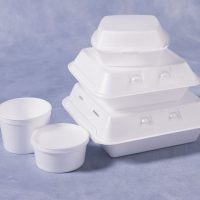
Will a bill to ban the use of styrofoam products pass the Fono this time around?
A new administration bill that would prohibit the importation, sale, distribution and use of styrofoam plates, cups, trays and other container products is now before the Fono.
The bill cites:
- Polystyrene foam plates, cups, bowls, trays and clamshell containers are commonly used as food and beverage containers in American Samoa, says the bill.
- Polystyrene contains a chemical used in the production process called styrene that has been linked to cancer, as well as reproduction and developmental disorders by the National Research Council.
- Styrene leaches from polystyrene foam containers into food and drink.
- The American Samoa Community Cancer Coalition states that cancer is the second leading cause of death in American Samoa.
To prevent harm on the health of users of styrofoam products and even death, the bill seeks to stop the importation and use of such products in American Samoa.
To help transition from styrofoam to acceptable alternative containers, the bill provides a one year reduction in excise taxes for new types of containers that are biodegradable and not harmful to health.
Importers will pay 4% excise tax, instead of 8%, for alternative containers during that one year reprieve which would begin from the date that the bill is passed, up to the day before the act’s effective date.
Penalties for violation of the ban on styrofoam products are:
- $50-$100 for a first offense
- $100-$200 for a second offense
- $400-$500 for a third offense
- S500-$1,000 for subsequent offenses
Exempted from the ban are:
- imported prepackaged food
- Trays used for raw meat, poultry, fish or frozen foods
- Polystyrene foam coolers and ice chests intended for reuse
- Packaging materials for non food items.
The bill was first introduced in 2020 and it was tabled in the Senate due to concerns that the reduction in excise taxes would hurt ASG revenues, which weren’t in a healthy position at the time.





